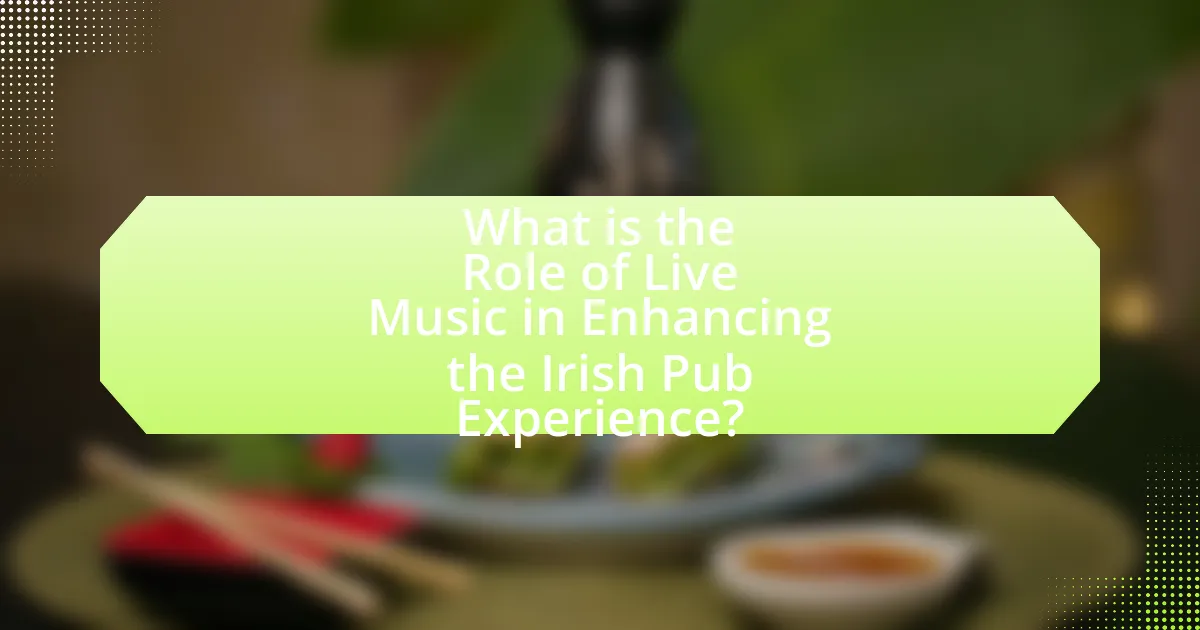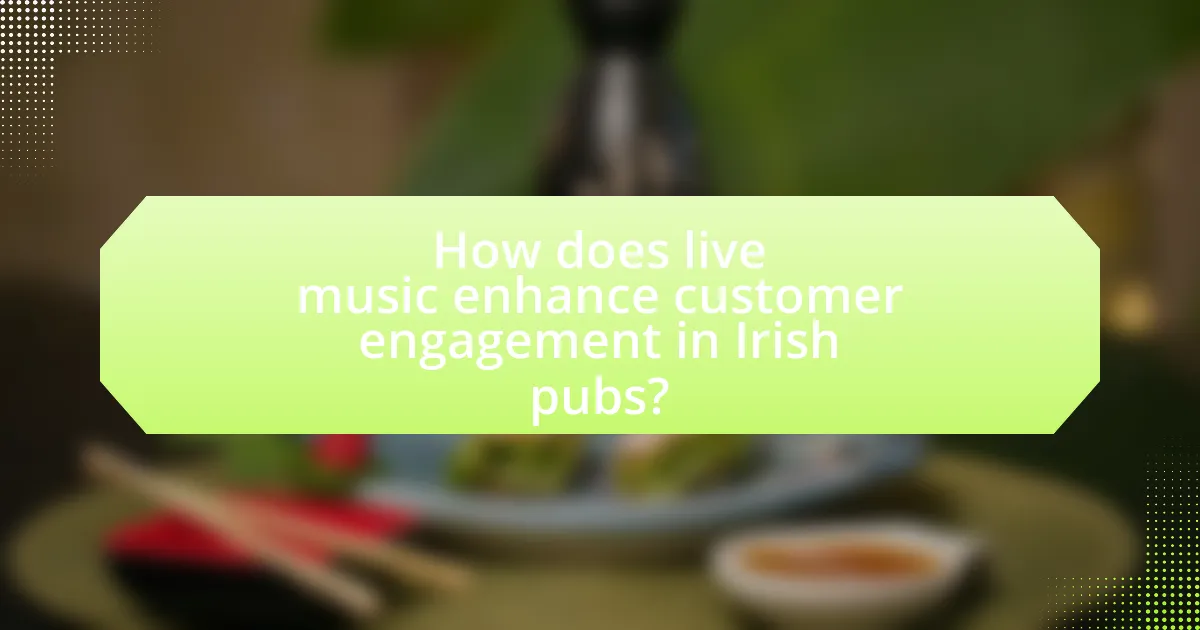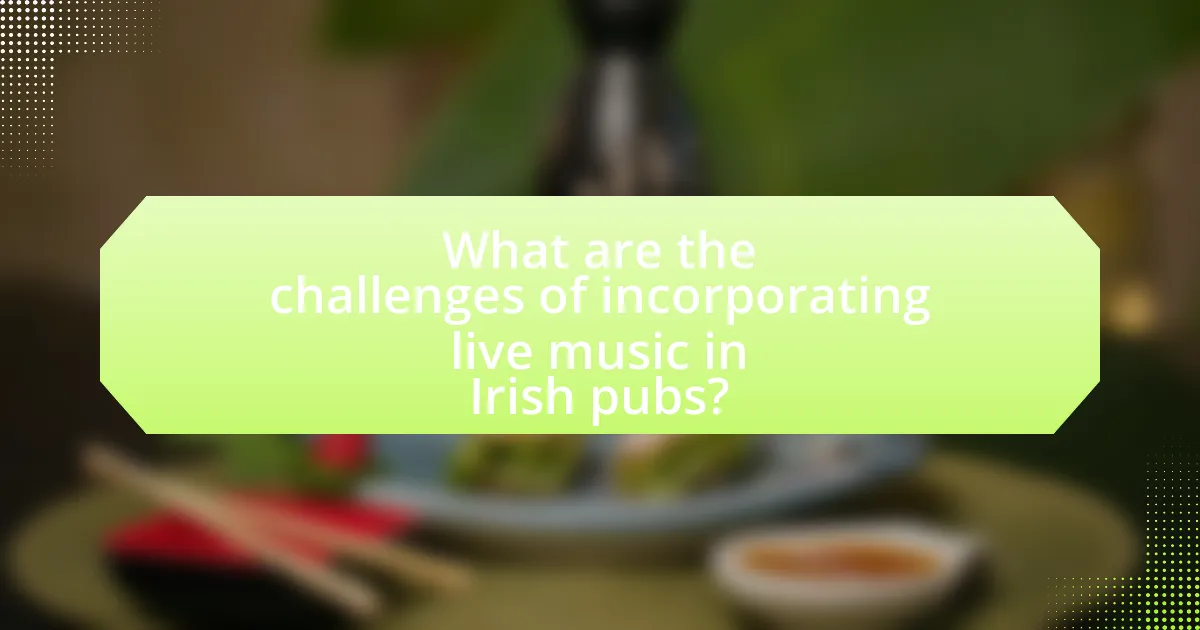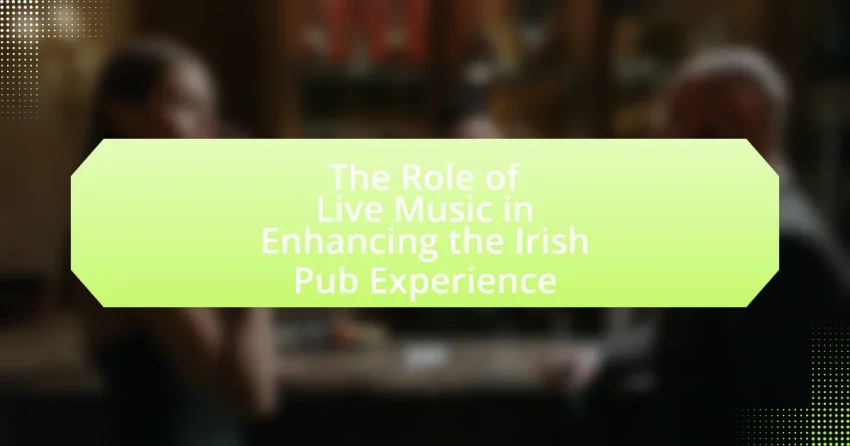The article examines the significant role of live music in enhancing the Irish pub experience, highlighting its impact on social interaction, customer satisfaction, and cultural connection. It discusses how live performances create a vibrant atmosphere that fosters community engagement and encourages patrons to participate in the musical experience. The article also explores the historical significance of live music in Irish culture, the evolution of musical genres in pubs, and the logistical and financial considerations involved in hosting live events. Additionally, it addresses the marketing strategies that can effectively promote live music, emphasizing the importance of sound quality and audience engagement in optimizing the overall experience.

What is the Role of Live Music in Enhancing the Irish Pub Experience?
Live music plays a crucial role in enhancing the Irish pub experience by creating an engaging and vibrant atmosphere that fosters social interaction. The presence of live musicians encourages patrons to gather, sing along, and participate in the communal enjoyment of music, which is a fundamental aspect of Irish culture. Studies have shown that live music can increase customer satisfaction and retention in hospitality settings, as it adds an element of entertainment that distinguishes pubs from other venues. Furthermore, traditional Irish music often evokes a sense of nostalgia and cultural pride, deepening the emotional connection patrons have with the pub environment.
How does live music contribute to the atmosphere of an Irish pub?
Live music significantly enhances the atmosphere of an Irish pub by creating an engaging and lively environment that encourages social interaction. The presence of musicians performing traditional Irish tunes fosters a sense of community and cultural connection among patrons, which is a hallmark of the Irish pub experience. Studies have shown that live music can increase customer satisfaction and prolong visits, as it provides entertainment that complements the social nature of pub gatherings. Furthermore, the spontaneous and often interactive nature of live performances invites audience participation, such as singing along or dancing, which further enriches the communal atmosphere.
What elements of live music create a welcoming environment?
Live music creates a welcoming environment through elements such as audience engagement, the atmosphere of shared experience, and the emotional connection fostered by live performances. Audience engagement occurs when musicians interact with the crowd, encouraging participation through singing along or dancing, which enhances the sense of community. The atmosphere of shared experience is cultivated as patrons enjoy music together, often leading to conversations and social bonding, which is vital in settings like Irish pubs. Emotional connection is established through the authenticity of live performances, where musicians convey feelings that resonate with listeners, making them feel included and valued. These elements collectively contribute to a warm and inviting ambiance that enhances the overall pub experience.
How does live music influence customer interactions in pubs?
Live music significantly enhances customer interactions in pubs by creating a vibrant atmosphere that encourages socialization and engagement. The presence of live performances often leads to increased customer attendance, as studies show that venues featuring live music can see up to a 30% rise in patron numbers. This lively environment fosters conversations among patrons, as shared musical experiences can break down social barriers and promote a sense of community. Additionally, live music can enhance the overall customer experience, leading to longer stays and increased spending, with research indicating that customers are willing to pay more for drinks and food in venues with live entertainment.
Why is live music a traditional aspect of Irish pubs?
Live music is a traditional aspect of Irish pubs because it fosters community engagement and enhances the social atmosphere. Historically, Irish pubs have served as gathering places where locals and visitors come together to share stories, celebrate, and enjoy music, which is deeply rooted in Irish culture. The presence of live music, often featuring traditional instruments and folk songs, creates an inviting environment that encourages interaction among patrons. This practice dates back centuries, as pubs were venues for musicians to perform and for communities to connect, solidifying live music’s role in the cultural identity of Irish pubs.
What historical significance does live music hold in Irish culture?
Live music holds significant historical importance in Irish culture as it serves as a vital medium for storytelling, community bonding, and cultural preservation. Traditionally, live music has been integral to social gatherings, particularly in pubs, where it fosters a sense of belonging and shared identity among participants. The oral tradition of passing down folklore and history through song has been crucial in maintaining Ireland’s rich cultural heritage, especially during periods of political strife and emigration. For instance, the 19th-century rise of the Irish folk revival highlighted the role of live music in reconnecting the diaspora with their roots, reinforcing cultural pride and continuity.
How has the role of live music evolved in Irish pubs over time?
The role of live music in Irish pubs has evolved from traditional folk performances to a diverse range of musical genres catering to varied audiences. Historically, live music in Irish pubs served as a means of community gathering and cultural expression, primarily featuring traditional Irish folk music played by local musicians. Over time, particularly from the late 20th century onwards, the introduction of various music styles, including rock, pop, and contemporary genres, has transformed the pub experience, attracting a broader demographic. This shift is evidenced by the increasing presence of live music events and festivals in pubs, which now often feature both local and international artists, enhancing the social atmosphere and economic viability of these establishments.
What types of live music are commonly featured in Irish pubs?
Irish pubs commonly feature traditional Irish music, folk music, and contemporary acoustic performances. Traditional Irish music often includes instruments like the fiddle, bodhrán, and tin whistle, creating an authentic cultural atmosphere. Folk music, which may incorporate storytelling elements, is also prevalent, reflecting the rich history and heritage of Ireland. Additionally, contemporary acoustic performances by local artists contribute to the diverse musical offerings in these venues, enhancing the overall pub experience. This variety of live music not only entertains patrons but also fosters a sense of community and cultural connection within the pub setting.
What genres of music are most popular in the Irish pub scene?
Traditional Irish folk music is the most popular genre in the Irish pub scene. This genre often features instruments such as the fiddle, bodhrán, and tin whistle, creating an authentic atmosphere that encourages audience participation. Additionally, contemporary Irish music, including rock and pop influences, has gained traction in pubs, appealing to a broader audience while maintaining cultural roots. The prevalence of these genres is supported by the fact that many pubs host live music sessions regularly, fostering a vibrant social environment that enhances the overall pub experience.
How do different types of live performances impact the pub experience?
Different types of live performances significantly enhance the pub experience by creating an engaging atmosphere that encourages social interaction and enjoyment. For instance, traditional Irish music fosters a sense of cultural connection and nostalgia, often leading to increased patron participation through singing and dancing, which can elevate the overall mood of the venue. In contrast, contemporary genres like rock or pop may attract a younger crowd, promoting a lively and energetic environment that can boost bar sales and customer retention. Research indicates that venues featuring live music report a 30% increase in customer dwell time, which correlates with higher spending on food and drinks. Thus, the type of live performance directly influences the ambiance, customer engagement, and economic success of the pub.

How does live music enhance customer engagement in Irish pubs?
Live music enhances customer engagement in Irish pubs by creating an immersive and social atmosphere that encourages interaction among patrons. The presence of live performances fosters a sense of community, as customers often gather to enjoy the music together, leading to increased socialization and shared experiences. Research indicates that venues featuring live music see higher customer retention rates, with a study by the University of Southern California showing that live music can increase customer dwell time by up to 30%. This extended engagement not only boosts sales but also enhances the overall pub experience, making it more memorable for visitors.
What role does live music play in attracting customers to Irish pubs?
Live music plays a crucial role in attracting customers to Irish pubs by creating an engaging and vibrant atmosphere that enhances the overall experience. The presence of live performances encourages social interaction, fosters a sense of community, and draws in patrons who seek entertainment alongside their dining or drinking experience. Research indicates that venues featuring live music can see a significant increase in foot traffic; for instance, a study by the Music Venue Trust found that 70% of customers are more likely to visit a pub that hosts live music events. This correlation highlights how live music not only enhances the ambiance but also serves as a strategic marketing tool for Irish pubs to differentiate themselves in a competitive market.
How does live music influence the duration of customer visits?
Live music significantly increases the duration of customer visits in pubs. Research indicates that establishments featuring live music can see customer stay times extend by up to 30% compared to those without. This is attributed to the engaging atmosphere created by live performances, which encourages patrons to linger longer, socialize, and enjoy the overall experience. Additionally, a study published in the Journal of Hospitality and Tourism Research found that live music enhances customer satisfaction, leading to increased dwell time as guests are more likely to order additional food and drinks while enjoying the entertainment.
What are the social benefits of live music for pub-goers?
Live music provides significant social benefits for pub-goers by fostering community engagement and enhancing social interactions. The presence of live performances encourages patrons to gather, share experiences, and connect with others, creating a vibrant atmosphere that promotes social bonding. Research indicates that environments with live music can increase feelings of happiness and belonging among attendees, as evidenced by a study published in the Journal of Music Therapy, which found that music can enhance social cohesion and reduce feelings of isolation. Additionally, live music events often serve as a platform for local artists, further strengthening community ties and supporting cultural expression within the pub setting.
How does live music affect the overall customer experience in Irish pubs?
Live music significantly enhances the overall customer experience in Irish pubs by creating an engaging and vibrant atmosphere. This dynamic environment encourages social interaction among patrons, fostering a sense of community and enjoyment. Research indicates that live music can increase customer dwell time and spending, as it elevates mood and satisfaction levels. For instance, a study published in the Journal of Hospitality and Tourism Research found that venues featuring live music reported higher customer retention rates and positive feedback compared to those without. Thus, live music not only enriches the ambiance but also contributes to the economic success of Irish pubs.
What sensory experiences are enhanced by live music in pubs?
Live music in pubs enhances auditory and social sensory experiences. The auditory experience is enriched by the live performance, which creates a dynamic sound environment that engages patrons more deeply than recorded music. This engagement can lead to increased emotional responses, as live music often evokes feelings of joy and nostalgia. Additionally, the social experience is heightened as live music fosters interaction among patrons, encouraging conversation and communal enjoyment. Research indicates that environments with live music can increase social bonding and overall satisfaction, making the pub experience more memorable and enjoyable.
How does live music contribute to customer satisfaction and loyalty?
Live music significantly enhances customer satisfaction and loyalty by creating an engaging and memorable atmosphere. This immersive experience fosters emotional connections, encouraging patrons to return. Research indicates that venues featuring live music report higher customer retention rates, with a study by the National Endowment for the Arts showing that 72% of attendees at live music events express increased satisfaction compared to those who do not attend. Additionally, live performances often lead to longer visits and increased spending, reinforcing loyalty as customers associate the venue with enjoyable experiences.

What are the challenges of incorporating live music in Irish pubs?
Incorporating live music in Irish pubs presents several challenges, including noise management, scheduling conflicts, and financial constraints. Noise management is crucial, as live performances can disrupt the atmosphere and conversation among patrons, leading to dissatisfaction. Scheduling conflicts arise when coordinating musicians’ availability with the pub’s operational hours, which can limit the frequency and variety of performances. Financial constraints also play a significant role, as hiring quality musicians and providing adequate sound equipment can strain the pub’s budget, particularly for smaller establishments. These challenges must be navigated to successfully integrate live music into the Irish pub experience.
What logistical considerations must pubs address when hosting live music?
Pubs must address several logistical considerations when hosting live music, including sound equipment, space allocation, scheduling, and licensing. Proper sound equipment is essential for quality performances, requiring investment in speakers, microphones, and mixing consoles. Space allocation involves ensuring there is adequate room for performers and audience, which may necessitate rearranging furniture or designating specific areas for the event. Scheduling is crucial to avoid conflicts with other events and to maximize attendance, often requiring coordination with performers well in advance. Additionally, pubs must secure the necessary licenses for live music, which can vary by location and may involve fees or permits. These considerations are vital for creating a successful live music experience that enhances the overall atmosphere of the pub.
How do noise regulations impact live music performances in pubs?
Noise regulations significantly impact live music performances in pubs by imposing limits on sound levels, which can restrict the volume and duration of performances. These regulations are designed to minimize disturbances to nearby residents and maintain public order. For instance, many local councils enforce specific decibel limits, often ranging from 85 to 95 decibels, which directly influences how musicians perform and the type of equipment used. Compliance with these regulations can lead to reduced audience engagement and limit the types of music that can be effectively performed, as louder genres may be curtailed. Additionally, failure to adhere to noise regulations can result in fines or the revocation of performance licenses, further affecting the viability of live music in these venues.
What are the financial implications of hiring live musicians?
Hiring live musicians incurs several financial implications, primarily including performance fees, equipment costs, and potential increases in operational expenses. Performance fees for musicians can range from a few hundred to several thousand dollars per event, depending on the artist’s popularity and experience. Additionally, venues may need to invest in sound equipment, lighting, and staging, which can add significant upfront costs.
Moreover, hiring live musicians can lead to increased operational expenses, such as higher staffing needs for managing events and potential increases in inventory due to larger crowds drawn by live performances. According to a study by the National Endowment for the Arts, venues that host live music often see a 20-30% increase in patron spending, which can offset the initial costs associated with hiring musicians. Thus, while the financial implications of hiring live musicians can be substantial, they can also lead to increased revenue through enhanced customer experiences and higher attendance.
How can pubs effectively promote their live music events?
Pubs can effectively promote their live music events by utilizing social media platforms, local advertising, and partnerships with musicians. Social media allows pubs to reach a broad audience quickly; for instance, Facebook events can inform followers about upcoming performances, while Instagram can showcase live clips to generate excitement. Local advertising, such as flyers in the pub and ads in community newspapers, targets nearby patrons who are likely to attend. Collaborating with musicians for cross-promotion can also enhance visibility; artists often share event details with their fan base, expanding the pub’s reach. According to a study by the Music Venue Trust, venues that actively engage in social media promotion see a 30% increase in attendance at live events.
What marketing strategies are most effective for promoting live music in pubs?
Effective marketing strategies for promoting live music in pubs include social media promotion, partnerships with local artists, and targeted email marketing. Social media platforms like Facebook and Instagram allow pubs to reach a broad audience, showcasing upcoming events and engaging with patrons. Collaborating with local musicians not only enhances the pub’s authenticity but also attracts their fan base, increasing foot traffic. Additionally, targeted email marketing campaigns can inform loyal customers about live music schedules, special promotions, and exclusive events, fostering a sense of community and encouraging repeat visits. These strategies are supported by data indicating that 78% of consumers are influenced by social media posts when deciding where to go for entertainment, highlighting the effectiveness of these marketing approaches.
How can social media be leveraged to enhance live music visibility?
Social media can be leveraged to enhance live music visibility by creating targeted promotional campaigns that engage audiences and increase event awareness. Platforms like Facebook, Instagram, and Twitter allow artists and venues to share event details, behind-the-scenes content, and live performances, reaching a broader audience. For instance, a study by the Pew Research Center indicates that 69% of adults in the U.S. use social media, making it an effective tool for connecting with potential attendees. Additionally, using hashtags and geo-tagging can improve discoverability, while user-generated content can amplify reach and authenticity, as fans share their experiences online.
What best practices should pubs follow to optimize the live music experience?
Pubs should prioritize sound quality, artist selection, and audience engagement to optimize the live music experience. High-quality sound systems enhance the clarity and richness of performances, making the music more enjoyable for patrons. Selecting artists who resonate with the target audience fosters a connection and encourages attendance; for instance, local musicians often draw in community members. Additionally, engaging the audience through interactive elements, such as song requests or themed nights, can significantly enhance the overall experience. These practices are supported by studies indicating that a positive live music experience increases customer satisfaction and repeat visits, ultimately benefiting the pub’s reputation and revenue.
How can pubs select the right musicians to match their brand and clientele?
Pubs can select the right musicians by assessing their brand identity and understanding their clientele’s preferences. This involves defining the pub’s atmosphere—whether it is traditional, modern, or themed—and identifying the musical genres that resonate with their target audience. For instance, a pub that promotes a cozy, traditional Irish experience may benefit from folk or acoustic musicians, while a contemporary venue might opt for pop or rock bands.
Research indicates that live music can significantly enhance customer satisfaction and retention; a study by the Journal of Hospitality and Tourism Research found that live music positively influences patrons’ emotional responses, leading to longer stays and increased spending. Therefore, aligning the musical selection with the pub’s brand and clientele not only enhances the overall experience but also drives business success.
What tips can enhance the sound quality and overall performance experience?
To enhance sound quality and overall performance experience in live music settings, ensure proper acoustic treatment of the venue. Acoustic panels and bass traps can significantly reduce unwanted reverberation and echo, allowing for clearer sound. Additionally, using high-quality microphones and speakers tailored to the venue’s size and layout improves audio fidelity. Research indicates that venues with optimized acoustics can increase audience satisfaction by up to 30%, as noted in a study by the Acoustical Society of America. Regular sound checks and adjustments during performances also contribute to maintaining sound quality, ensuring that the mix is balanced and engaging for the audience.
